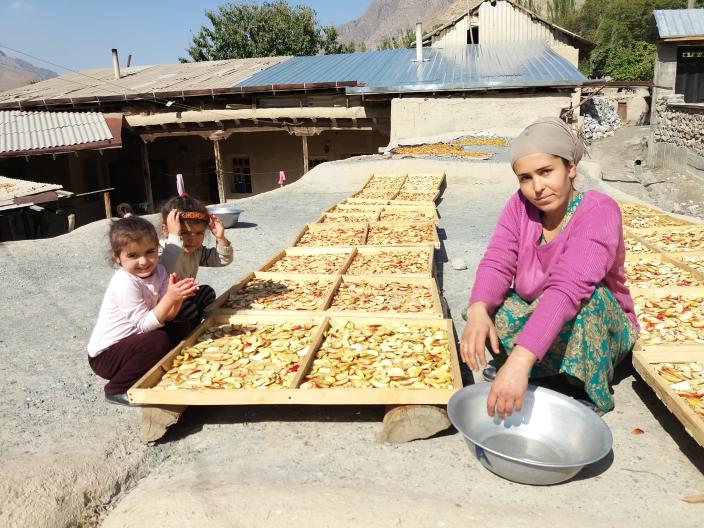“Sometimes we exchanged our apples for spoons and utensils. But we had no choice. I had to sell my apples, otherwise they would rot,”
Sharofat Sharipova, a 39-year-old woman from Zimtud Village, is a harbinger of hope and joy to her neighbours. It is late summer in Zerafashan Valley and apple trees laden with fruit are in blossom. Like other smallholder farmers in the village, Sharofat owns a small patch of land, less than a fifth of a hectare in size with 25 standing apple trees. "While the arrival of a good apple harvest filled our heart with delight, we would feel a heavy burden of worry. Where will we sell our apples? Is the market good this year? If we do not find a buyer, where will we store such huge volumes? These questions scared us every season and we had no answers". Sharofat said.
"Sometimes we exchanged our apples for spoons and utensils. But we had no choice. I had to sell my apples, otherwise they would rot," she added.
For a poor farmer like Sharofat who has two children, a whole day's trip to from her remote mountain village to Panjakent city to sell apples was out of the question. ‘With small produce, going to the city to sell apples is a waste of time and a risk since we do not know the Panjakent market. Since we do have connections with market agents, we have to wait for a buyer to come to our village’, Sharofat said.
In recent years, adverse and unexpected weather events have made apple production in the region erratic. This has worsened the vulnerabilities faced by smallholder farmers in the region. With fewer apples to sell, their income has been reduced. "My apple produce was been badly hit for two straight years, from two Metric tons (MT) T in normal season to less than 1.5 MT in the past year", Sharofat said.
"Income from the sale of apples is critical for my family. It supplemented the remittances sent by my husband from Russia but since the COVID-19 pandemic, my husband is stuck at home, and now we are solely dependent on apple sales for our survival". she added.
In 2016, Oxfam began mobilising smallholder farmers in villages to build a network of Producer Group platforms in the region. Using the village community-based organization (CBO) as the entry point, field mobilisers from Oxfam initially held dialogues with farmers and motivated them to join Producer Groups to improve their production and income. Once the Producer Group was constituted, Oxfam helped new members organise into a self-governing entity and organize training and exposure trips for members to model farms. Farmers were also trained in the best horticulture practices, the use of new equipment and inputs and apple processing. Oxfam also built a market information system to connect village famers to markets in Panjakent and other centres.
Over the past four years, Oxfam has mobilised more than 800 farmers, including 300 women farmers cultivating apples, apricots and grapes, as part of the growing network of PGs in the Zerafshan Valley. As a decentralised network of farmers, Producer Group platforms are designed to serve two main purposes: facilitate the adoption of improved technology and practices for enhanced fruit production and processing and connect Smallholder Farmers to markets, harnessing the advantage of scale offered by the Producer Group platform. "In the first year, we learnt about training in class and in the field and went on exposure trips where we saw how improved techniques can help us in cultivation, harvesting and reducing wastage", said Sharofat.
As farmers were being organised and trained in improved technology, Oxfam also set up a chain of 23 village agronomists, who offered advisory services to the farmers.
"The village agronomists were a great help to us. While our training with Producer Groups helped us understand improved fruit cultivation techniques, village agronomists provided us hands-on support with adopting new methods. They were always available to help with advice, which gave us confidence’, said Sharofat.
To integrate Producer Group with the markets, Oxfam adopted a two-pronged strategy to leverage private companies to build processing capacity and skills at the village level and set up a regional union of Producer Groups to augment scale. Oxfam facilitated private fruit processing companies to conduct seven training sessions for 803 farmer members (36 PGs), with a view of introducing the latest processing techniques at the village level, improving quality and therefore marketability of processed fruits.
"Before the training, we had no knowledge of quality, which led to poor returns for our produce in market. Training helped us understand the specific quality that is in demand in the market. I learnt how to cut, dry and store my dried apples to get a better price. I could actually see the difference in quality. Last year, I sold my dried apples at TJS 3-8 per kg. Before PG, I was selling a kilo for only TJS 1.5-2," said Sharofat.
In 2019, Oxfam facilitated the setting up of a new legal entity, Producer Group Union, or Smallholder Farmer Cooperative, comprising 1,000-plus fruit growers from the region. The Producer Group Union draws most of its members from the Producer Groups. Oxfam later supported the Producer Group Union to enter into a business partnership with a private fruit processing company, under the Farmer Producer Partnership (FPP) arrangement. An MoU was signed between company and the Producer Group Union. Over the past season, the company has provided direct market access to 1,000-plus SHF in the region, procuring 17,500MT of fresh and 12,800 dried apples at a guaranteed price benchmarked above the average wholesale market.
‘Last year, my Producer sold 700 kg of dried apple to ZFE at market rate between TJS 3–8 a kilo. Getting a good market price even in the low production season is a lifesaver for us. For now, our worries are gone’, said Sharipova with confidence in her eyes.
